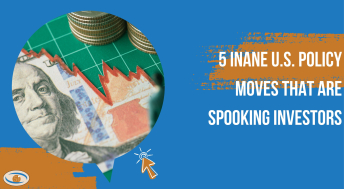Companies That Don’t Need Money are The Best Investments
For some reason, I really like time-travel movies. It is fascinating to wonder what might happen if timelines were altered. With that theme, let’s look at five things I would tell a younger version of myself if I travelled back to 1985 when I first started out in the investment business.
Analysts are not working for you
Stock analysts were my idols when I first started looking at investments. They had a high profile, knew everything about the companies they followed and could move the market with a change in opinion or target price. Wow. Moving a stock significantly up or down just with a few words was — to the young me — a pretty impressive feat.
But over the years, I came to realize analysts were not working for individual investors; they were working for companies, their bonuses and their bosses, and, to keep their (cushy) jobs. Companies they followed sent them their trading and investment banking business. This kept their bonuses flowing. Being extra conservative meant an analyst never stood out as wrong (or right). This kept them in their jobs.
I would rarely doubt an analyst’s smarts, but they all ended up following companies that needed money and never liked to stick their necks out and tell you how they really felt. Most recommendations were buys and all analysts’ target prices gravitated around a very narrow range. As the years went by, I found them less and less useful.
The Market is Not Very Efficient
All the investment courses I took before and after I started my career talked about the efficiency of the market. But it really isn’t. If it was, then a short seller would not be able to drive a stock price down 35 per cent by issuing a blasphemous report. If the market was really efficient, all should be known and reflected in stock prices — a short attack shouldn’t be very profitable. I have also found that stocks move — sometimes more so — on sentiment rather than fundamentals.
Every Panic is a Buying Opportunity
I was a young stock broker in 1987, and was working the phones on Black Monday when the Dow Jones fell 22 per cent in a single day — its worst decline ever. I didn’t really have much money or investments at the time, but if I did, I am sure I would have panicked and sold like everyone else considering it was my very first crisis.
But with about 50 or 60 various panics since then, I’ve learned that going the other way against panicked sellers is a pretty good way to make money. Panicked sellers don’t think rationally, don’t sell for fundamental reasons and, well, panic. Buyers can step in and get bargains. If they have enough time, they can usually do pretty well. Royal Bank of Canada shares traded for $3.58 each on the day of the 1987 crash. They are $130 now, and pay a $5.28 annual dividend to boot. If one is a long-term investor, panics can be great opportunities.
Companies That Don’t Need Money are The Best Investments
This goes a bit in tandem with the first point. If a company doesn’t need money, and its growth is fully funded internally, you are not likely to get a phone call about it. The best companies simply go about their business, year after year, and compound capital. Without needing new equity, shareholders are not diluted. All growth accrues to the existing owners.
These companies can be harder to find. They may not trade much. They may not pay dividends. They may not make the news for 10 years, after which their strong investment performance might finally get noticed. But they are out there. Before buying any stock, an investor should look at how the share count has grown (or not) over the past 10 years. We certainly try to avoid companies that consider their stock like an ATM and issue shares too often.
Don’t Sell Your Winners Early
I would tell my younger self that when you have a winning stock, it is winning because others like it. Your positive thesis for owning the stock in the first place is being confirmed by hundreds, if not thousands, of other investors. Plus, I would remind myself that a larger company often gets a higher valuation. Investors see size as a sign of safety, and often it is, but not always.
A stock you own that keeps ticking higher may be one of those rare gems that rises thousands of per cent. It’s fine to review it — certainly, it may pay to find out why others like it so much now — but don’t sell just because it is up. You can sell for other reasons if you want, but not for that reason. You will never have a stock rise 10,000 per cent if you sell it after a 500 per cent rise.
Take Care,







Comments
Login to post a comment.